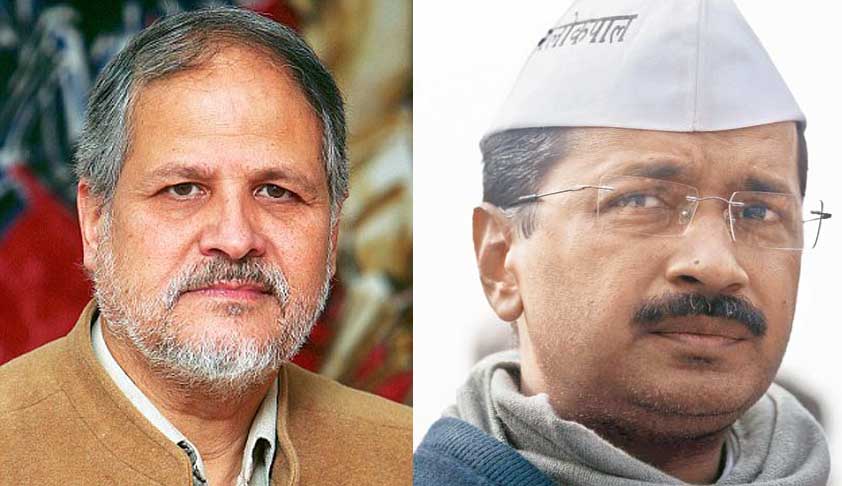Constitutional Dilemma Of Delhi
Dr.Yogesh Pratap Singh & Dr.Afroz Alam
25 Oct 2016 3:32 PM IST

The age of elected representative government has passed. Its legitimacy is being seriously challenged. This proposition owes much to Delhi High Court’s 194-page judgment that reduced an elected government merely to a ‘parasitically dependent’ department of Central Government that lacks control over political decision-making. Surprisingly, legal and constitutional provisions are invoked and interpreted to serve the personal crusade of individuals and political parties than to democratic and constitutional values.
Ontological Explanation
The High Court considered Delhi as Union Territory (UT) and Lt. Governor as the sole and final administrator but in the process missed out democratic ethos and sentiments. The 69th Constitutional amendment followed by GNCTD Act was a significant progress towards statehood. Delhi with a Legislative Assembly is now placed between UT and States. Delhi’s Legislative Assembly under Article 246 and Article 239 AA (3) enjoys greater legislative powers with regard to State List and Concurrent List except with respect to Entries 1, 2, 18, 64, 65 and 66 comparing other Union Territories.
Article 239AA (4) read with Section 41 of GNCTD Act, 1991 makes it clear that the discretion of the Lt. Governor extends only to matters which falls outside the Legislative Assembly of Delhi i.e. Entries 1, 2 and 18 of the State List and Entries 64, 65 and 66 of the List in so far as they relate to the said entries; or in respect of matters of which powers are entrusted or delegated to him by the President [Article 239AB] or where he is required by law to act in his discretion or to exercise any judicial or quasi-judicial functions. Matters which falls within the purview of Legislative Assembly, the Lt. Governor should respect the advice of the council of minister which is collectively responsible to the Legislative Assembly [Article 239AA (6)] and not to the Lt. Governor. The proviso to Article 239AA (4) provides a conflict resolution mechanism in the event of Lt. Governor exercising power on reserved subjects or in situations requiring him to consult the Chief Minister/Council of Ministers as provided under Rule 45 of the Transaction of Business Rules.
If Lt. Governor is the sole administrator (as a representative of the President) then provision for President Rule (See Article 239AB) makes no sense. It would be absurd to apply President’s Rule in President’s own Territory.
Article 239AA is a self-contained code and only in case of failure of constitutional machinery the President may bring NCT under Article 239. Section 45 of GNCTD Act (Analogous to Article 167 of the Constitution) was too misjudged by the learned judges. The obligation of the Chief Minister to communicate the Lt. Governor is limited to the final decision taken. No Rule of interpretation by any stretch of imagination can say that it is required to take prior permission from the Lt Governor in all cases.
Genealogical Explanation
Historical facts also corroborate that Delhi was a federal unit of India despite having minimum provincial autonomy as Chief Commissioner Province under the Government of India Act 1935.The demand for greater autonomy for Delhi has a long history. It began in 1947, when a committee constituted by the Constituent Assembly recommended that Chief Commissioner Provinces like Delhi should be administered by the Lt. Governor and the Council of Ministers responsible to an elected legislature but it was not considered in the Draft Constitution of 1948. It was rather proposed that Chief Commissioner Provinces “would be administered by the President through a Chief Commissioner or the Lt. Governor or the ruler of a neighbouring State. The President could also by an order “create for any such area a local legislature or council of advisor or both, with such powers and functions in each case as may be specified in the order.” This draft was heavily criticised. Desh Bandhu Gupta from Delhi made impassioned appeal for acceptance of unanimous recommendation of the committee on Chief Commissioner Provinces and introduction of accountable government in Delhi, Ajmer-Merwara and Coorg. Mukut Behari Lal also spoke in the same tone. However, these appeals were unheeded and exercising power under Article 240, Parliament passed the Part ‘C’ States Act, 1951.
The demand for an autonomous anddemocratic Delhi became more distinct when the State Reorganisation Commission (1956) recommended Delhi to be placed under Corporation with substantial powers. Ironically, Jan Sangh whose later incarnation, Bhartiya Janta Party (BJP) which first raised the demand of full statehood for Delhi in 1993, agreed to the proposal but other parties demanded retention of democratic regime in Delhi. When the report of the Commission tabled in the Parliament, Sucheta Kriplani voiced her objections on the status of Delhi as “Delhi is going to lose its democratic set up. We are going to lose the status of State. Our people will be disenfranchised. In place of legislature we are going to be given Corporation with limited powers. Therefore, I feel Delhi is not being dealt fairly.” C.K. Nair also articulated that Delhi has not been given a fair deal by the Commission.She observed, “But what we expected is a fair deal for Delhi just as every Part C State was added to Part A State, which means greater advantage and greater freedom for people of those areas. It is not so with regard to Delhi.” Radha Raman argued that “If Delhi is made centrally administered it will be a retrograde step.” Shri Punnoose explicitly said that the Commission had placed the Delhi under bureaucracy. Ashok Sen Committee in 1962 recommended for largest possible autonomy to the Union Territories. Finally, Delhi was named as Union Territory in 1956 and a National Capital Territory in 1991.
Since 1993 all political parties have consistently been making promises to the electorates for full statehood for Delhi but without any conviction. Undoubtedly, the demand for full statehood for Delhi has many security and strategic drawbacks but stripping an elected government of its power is an alarming indicator equally. If a responsible government is the locus of democracy in representative system of India, shouldn’t the government of a Union Territory be allowed to function adequately? Is it encouraging for a new political party which is expected much to deliver in the already messed up politics of the country?
Conclusion
Explanation-I attached to Article 3 necessitate that “In this article, in clauses (a) to (e), “State” includes a Union Territory…” It is also pertinent that when Punjab was reorganised (1966) and a part of the territory was proposed to be transferred to Union Territory of Himanchal Pradesh, the Constitution (Eighteenth) Amendment Act was enacted clarifying that the term State in Article 3 would include a Union Territory as well. Similarly, having regard to Article 367, the Union Territories are treated as State under Section 3(58) of General Clauses Act of 1897 which says, “State as respects any period after the commencement of the Constitution Amendment Act, 1956 shall mean a state as specified in the first schedule of the Constitution and shall include a union Territory. Thus, Delhi High Court affirming Delhi as Union Territory and the disputes between Delhi and the Centre a non-federalare misconceived.
Undeniably, the Parliament has plenary power to make law [under article 246(4) and 248] for the territory of Delhi if it chooses to do so, in absence of it the Legislature of Delhi is the law-making body. Similarly; Lt. Governor as an executive head enjoys certain more discretion in comparison to a Governor of State, but otherwise he has to act in accordance with the aid and advice of the Council of Ministers. Making him singular authority will erode the democratic and responsible governance at the cost of demos. Neither is the government able to serve its people nor is the Lt. Governor able to keep his oath to “preserve, protect and defend the Constitution”. In this situation, the ultimate casualty is the democratic governance at the cost of demos. Let the better sense prevail in the verdict of the Apex Court.
 Dr.YogeshPratap Singh is a Deputy Registrar in Supreme Court of India and
Dr.YogeshPratap Singh is a Deputy Registrar in Supreme Court of India and  Dr.Afroz Alam is an Associate Professor & Head,Department of Political Science Maulana Azad National Urdu University (MANUU), Hyderabad
Dr.Afroz Alam is an Associate Professor & Head,Department of Political Science Maulana Azad National Urdu University (MANUU), Hyderabad
The opinions expressed in this article are the personal opinions of the authors. The facts and opinions appearing in the article do not reflect the views of LiveLaw and LiveLaw does not assume any responsibility or liability for the same.
This article has been made possible because of financial support from Independent and Public-Spirited Media Foundation.


